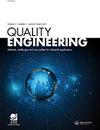Contextual anomaly detection for multivariate time series data
IF 1.3
4区 工程技术
Q4 ENGINEERING, INDUSTRIAL
引用次数: 0
Abstract
Abstract With the advancement of sensing technologies, sensor data collected over time have become more useful for detecting anomalies in underlying processes and systems. Sensor data are often affected by contextual variables, such as equipment settings, and can have different patterns, even in normal states depending on the contextual variables. Motivated by this problem, we propose a contextual anomaly detection method for multivariate time series data. We first build a prediction model using training data consisting of only normal observations, and then perform anomaly detection based on the prediction errors for future observations. The prediction model is based on a long short-term memory (LSTM) network that can flexibly model complex relationships between variables as well as temporal correlations between successive time points using the high expressive power of deep recurrent neural networks. In particular, to incorporate the contextual information while ensuring that it does not propagate over time but affects the response data only at specific target time points, we extend the standard LSTM by adding a layer for the contextual variables separately for each time step. The performance of the proposed method was verified with several open-source datasets and a real dataset from a global tire company.多元时间序列数据的上下文异常检测
摘要随着传感技术的进步,随着时间的推移收集的传感器数据对于检测底层过程和系统中的异常变得更加有用。传感器数据通常受到上下文变量的影响,如设备设置,并且可能具有不同的模式,即使在正常状态下也是如此,这取决于上下文变量。基于这个问题,我们提出了一种多变量时间序列数据的上下文异常检测方法。我们首先使用仅由正常观测组成的训练数据建立预测模型,然后基于预测误差对未来观测进行异常检测。该预测模型基于长短期记忆(LSTM)网络,该网络可以使用深度递归神经网络的高表达能力灵活地建模变量之间的复杂关系以及连续时间点之间的时间相关性。特别是,为了合并上下文信息,同时确保其不会随时间传播,而是仅在特定目标时间点影响响应数据,我们通过为每个时间步长单独添加上下文变量的层来扩展标准LSTM。通过几个开源数据集和一家全球轮胎公司的真实数据集验证了所提出方法的性能。
本文章由计算机程序翻译,如有差异,请以英文原文为准。
求助全文
约1分钟内获得全文
求助全文
来源期刊

Quality Engineering
ENGINEERING, INDUSTRIAL-STATISTICS & PROBABILITY
CiteScore
3.90
自引率
10.00%
发文量
52
审稿时长
>12 weeks
期刊介绍:
Quality Engineering aims to promote a rich exchange among the quality engineering community by publishing papers that describe new engineering methods ready for immediate industrial application or examples of techniques uniquely employed.
You are invited to submit manuscripts and application experiences that explore:
Experimental engineering design and analysis
Measurement system analysis in engineering
Engineering process modelling
Product and process optimization in engineering
Quality control and process monitoring in engineering
Engineering regression
Reliability in engineering
Response surface methodology in engineering
Robust engineering parameter design
Six Sigma method enhancement in engineering
Statistical engineering
Engineering test and evaluation techniques.
 求助内容:
求助内容: 应助结果提醒方式:
应助结果提醒方式:


